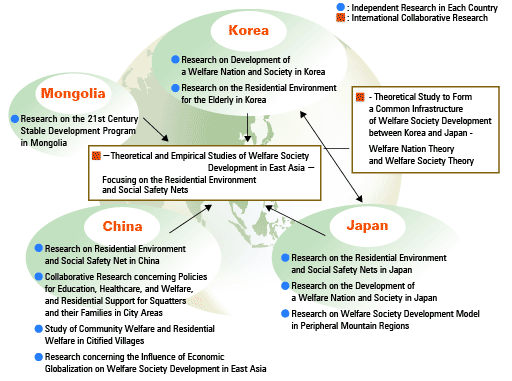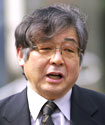 |
It is said that the 21st century is the century of Asia, and for economic and social system development suitable for Asian-specific lifestyles and culture, implementation of a quality residential environment, which is the basis of human dignity and human rights, and the stabilization of a social safety net, are indispensable.
Our environment is a social infrastructure where we can live safely. This ranges from our houses, neighboring streets, communities, to our cities, countryside, and country. Within this environment, social policies function as a “social safety net” against the potential risks to individual social members and their families, just as the original derivation does for the protection against the risks facing the circus performer.
In our Fourth Domain, we carry out interactive research in East Asian countries, centered on China, Korea, and Japan. Although these countries share a similar cultural background through their long historical exchanges, their social systems and the problems they face are quite different. Through the interaction of researchers and experts in residential environment and social policies of East Asian countries, we aim at determining the optimum welfare society development suitable for differing cultures and social systems. We believe that our research will significantly contribute to the advancement of welfare society development across all of Asia, as well as the three major countries of our research. |
 |
|
The Fourth Domain covers a wide-range of research fields: Theoretical and Empirical Studies to Form a Common Infrastructure of Welfare Society Development between Korea and Japan; Theoretical and Empirical Studies to Develop an East Asia Welfare Society from the Viewpoint of Residential Welfare; Possibility of Developing a Community Welfare Model for the Elderly in China; Study of Community Welfare and Residential Welfare in Citified Villages in China; Collaborative Research concerning Policies for Education, Healthcare, and Welfare, and Residential Support for Squatters and their Families in Chinese City Areas; Research concerning the Influence of Economic Globalization on Welfare Society Development in East Asia; and the 21st Century Stable Development Program and Welfare Society Development Research in Mongolia.
|

| Bird’s–Eye View of Research on Welfare Society Development in East Asia (Sadahisa Noguchi) |
 |
The discussion underlying the research in this domain is the Western-style welfare state typology as suggested by G.Esping-Anderson, and the discussion concerning the characteristics of the welfare state in East Asia that has arisen as a reaction to G.Esping-Anderson’s theory. Such discussion of the East-Asian-style welfare state derives from the social changes that they have undergone, such as the IMF crisis in 1997 and the subsequent changes in the welfare policies of Asian countries, the rise of new liberalism, the end of Orientalism, and the entire question of the existence of an East Asia regime.
In light of this, the focuses of approaches in this research of Welfare Society Development in East Asia are as follows:
1) From the viewpoint of the residential environment – Voluntary development via establishing a residential environment as the infrastructure of life and human rights, inclusive of environment, culture, development, health, and housing.
2) From the viewpoint of local community – Empowerment of the community through implementation of voluntary challenges against social exclusion, isolation, and the violation of human rights, by an individual, their family, and their local communities.
3) From the viewpoint of the social safety net – Social renaissance strategy through enforcement of policies that secure a sustainable quality of community life that is able to counteract exploitation from economic globalization. |
|
 |


Professor, Social Welfare Course, Graduate School of Social Welfare
Sadahisa Noguchi |
|
 |





